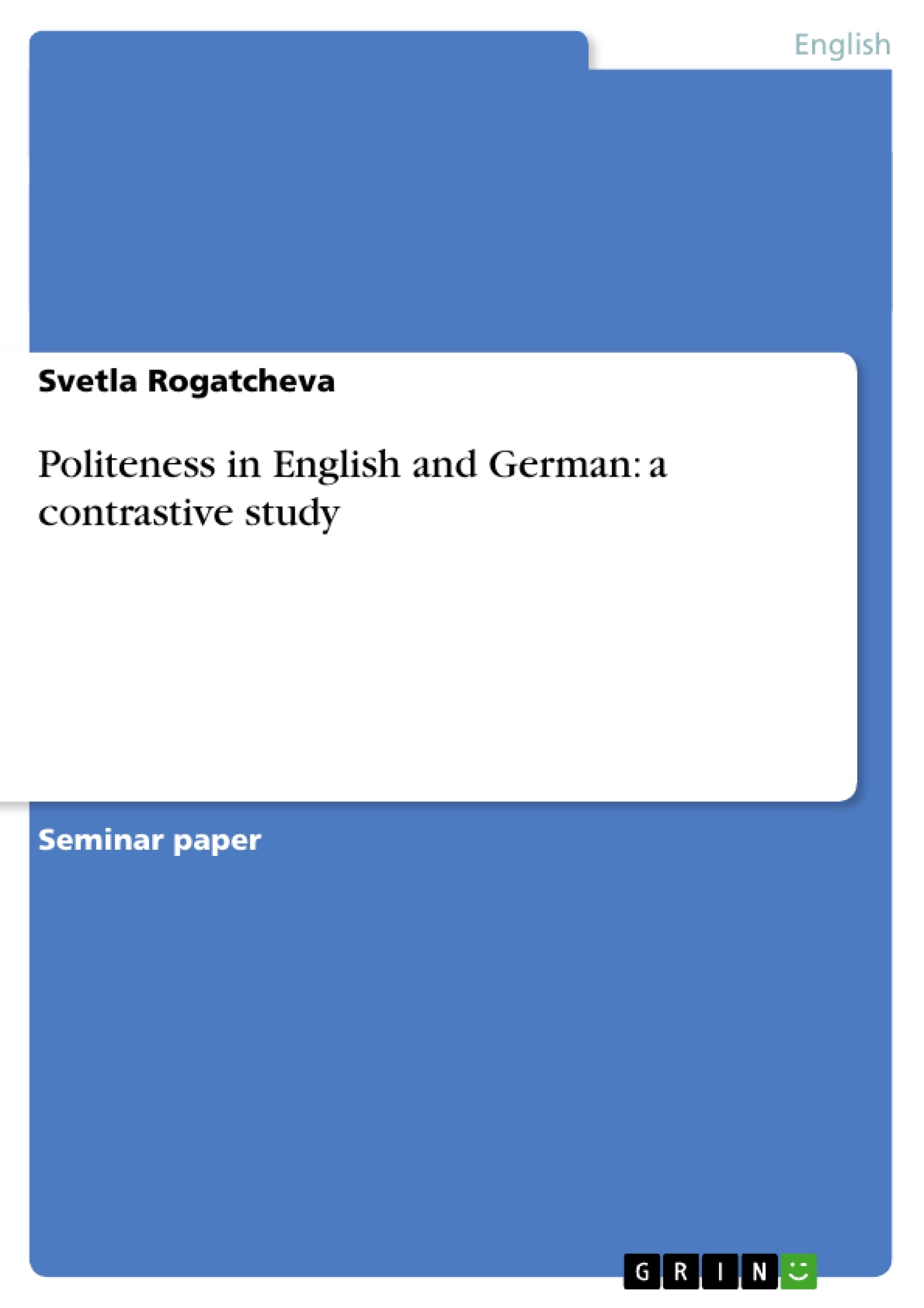Almo st all linguistic research views politeness as a universal feature of civilized societies, regardless of their background culture, or their language. Politeness is thus seen as an important social or ‘urbane’ value, inherent to successful communication, although its realization may vary across the different speech communities. Politeness offers a good way of emotional control of the individual (House and Kasper, 1981: 158), and is typically means of preserving and maintaining good social relationship between the speakers of one or more cultures. Polite behaviour generally protects the individual, as well as their addressee, and often becomes subject matter of self- help books on etiquette, especially in cases when people belong to a specific hierarchy (roya l court, business company etc).
The verbal realization of politeness poses even greater problems when the interlocutors belong to different cultures and try to communicate, transferring their pragmatic knowledge of polite behaviour into the foreign langua ge. Lack of practice and the learners’ concern with rendering correctly the foreign language’s grammatical structures in the first place often lead to misunderstandings, or the so-called ‘socio-pragmatic failures’ (Thomas, 1983)- ‘ errors resulting from no n- native speakers not knowing what to say or not saying the appropriate things as a result of transferring incongruent social rules, values and belief systems from their native languages and cultures’. These types of errors are likely to cause a downright insult for both the non- native and the native speakers of a certain language, the native speakers misunderstanding and misinterpreting the intentions of the non- native speaker, and the nonnative speakers being over-sensitive to ‘distinctions of grammatical form’ (Brown and Levinson 1996: 35), in a way the native speakers are not. In any case, being polite is essential to maintaining healthy social relations within a specific culture, and even more so, for the communication across cultures.
Cross-cultural communication offers a wide field for research, as the socio-pragmatic failure of one speaker of a certain community tends to be stereotyped for the whole community (Knapp-Potthoff 1992: 203), consequently labeling a nation as rude, over-polite, insincere etc.
[...]
Inhaltsverzeichnis (Table of Contents)
- 1. Introduction- Why be polite? Problems in cross-cultural communication
- 1.1. The popular view- cultures and prejudices, relative vs. absolute politeness
- 2. The linguistic view- Theoretical Framework
- 2.1. Leech's Interpersonal Rhetoric
- 2.2. The concept of face, positive and negative politeness strategies
- 3. Realising Politeness in German and English
- 3.1. Comparing all-German and all-English interaction: requests and complaints
- 3.2. Mediated German- English requests and complaints
- 3.3. Politeness markers in academic texts of German and English
- 4. Conclusion (some personal remarks)
Zielsetzung und Themenschwerpunkte (Objectives and Key Themes)
The text examines politeness as a universal feature of civilized societies, highlighting the challenges of cross-cultural communication due to varying understandings of politeness. The objective is to compare the politeness practices of German and English speakers, analyzing native and cross-cultural interactions, as well as written texts in both languages.
- The role of politeness in communication
- The influence of cultural norms on politeness strategies
- The concept of face and politeness strategies in English and German
- Cross-cultural misunderstandings and the impact of socio-pragmatic failures
- A comparative analysis of politeness markers in spoken and written discourse
Zusammenfassung der Kapitel (Chapter Summaries)
- Chapter 1: The Introduction delves into the universal nature of politeness, exploring its significance in fostering successful communication across different cultures. It highlights the challenges of cross-cultural communication, particularly socio-pragmatic failures, resulting from misinterpretations of politeness conventions. The chapter outlines the importance of understanding cultural differences in politeness strategies to avoid misunderstandings and maintain good social relations.
- Chapter 2: This chapter presents a theoretical framework for analyzing politeness as a linguistic phenomenon, exploring definitions and theories that emphasize the indirectness and circumlocutionary nature of polite speech acts. Leech's Interpersonal Rhetoric, with its focus on the Cooperative Principle and Politeness Principle, is discussed as a tool for understanding the interplay between politeness and communication.
- Chapter 3: This chapter examines the realization of politeness in German and English, comparing native interactions, mediated interactions, and politeness markers in academic texts. It delves into the specific features of politeness strategies in each language, potentially highlighting key differences and similarities in how politeness is expressed.
Schlüsselwörter (Keywords)
The key concepts explored in this text include politeness, cross-cultural communication, socio-pragmatic failures, face, positive and negative politeness strategies, interpersonal rhetoric, the Cooperative Principle, the Politeness Principle, German language, English language, and comparative linguistics.
Frequently Asked Questions
What is a 'socio-pragmatic failure'?
It occurs when a non-native speaker uses grammatically correct language but violates the social or cultural rules of the target language, often leading to unintended rudeness or misunderstanding.
How does the concept of 'face' relate to politeness?
Based on Brown and Levinson, 'face' refers to an individual's self-esteem and public self-image. Politeness strategies are used to avoid 'face-threatening acts' (FTAs) during communication.
What are the main differences between German and English politeness?
Research often suggests that German politeness tends to be more direct and content-oriented, while English politeness relies more on indirectness, hedges, and 'negative politeness' strategies.
What is Leech's Politeness Principle?
Geoffrey Leech proposed a set of maxims (like Tact, Generosity, and Modesty) that complement Grice's Cooperative Principle, explaining why people often speak indirectly to maintain social harmony.
Why is cross-cultural communication research important?
It helps identify stereotypes and reduces prejudices by explaining that what might seem like rudeness in one culture is often just a different linguistic realization of politeness.
- Arbeit zitieren
- Svetla Rogatcheva (Autor:in), 2003, Politeness in English and German: a contrastive study, München, GRIN Verlag, https://www.grin.com/document/30085



